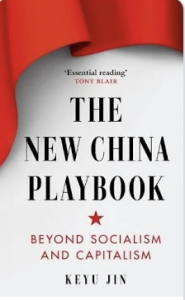The New China Playbook: Beyond Socialism and Capitalism by Keyu Jin is quite an interesting read. As I’m not at all a China expert it’s hard for me to evaluate its claims, but the framing is persuasive. This is that the combination of political centralization and economic decentralization is not widely understood and makes China unique. Local officials have strong incentives to encourage local entrepreneurship or ‘inward’ investment from other parts of China. “The link between local growth and political promotion is what makes China’s case unique.” (I like the joke the book recounts: ‘GDP figures roduce officials and officials produce the GDP figures’.) This close public-private relationship is also cemented by the weak public but non-party institutions, meaning businesses have to overcome many barriers through such relationships. She writes: “China has strong state capacity and weak institutions,” which she contrasts to the strong formal instituions but weakening capacity in the US.
The book has some fascinating early chapters on the new phase of state mobilization and also the political/cultural/economic implications of so many Chinese people being only children. On the latter, she argues that it is a psychological burden being ‘only’ because of the expectation that they are the only people able to look after elderly parents. Later chapters go into more familiar territory such as the economy’s debt levels, and the financial system – the book is far more sanguine about the implications for stability than are other commentators. And the final chapter looks at innovation, the country’s impressive ability to adopt, manufacture and diffuse new technologies (“the Chinese are particularly good at making existing technology both better and cheaper”), and its focus on attaining the technology frontier in some areas.
All in all, the book is an optimistic take on China’s economic (and political) model, albeit expressing some reservations. For what it’s worth, the book has stellar back cover praise from Tony Blair, Ken Rogoff and Kai-Fu Lee. It’s well worth a read as a counterbalance to more pessimistic takes, even if one emerges as more sceptical than the author about the strengths or otherwise of the Chinese model.

